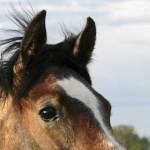Equine Behavior and Dopamine Levels

A group of researchers from the United Kingdom* suggest that dopamine plays an important role in how horses behave (or misbehave!).
Dopamine is a potent chemical, called a neurotransmitter, produced in certain brain cells that plays an important role in learning, memory, pleasurable reward, behavior, attention, sleep, and mood.
Clearly, dopamine levels are not to be trifled with. Borrowing two examples from human medicine, low levels of dopamine exist in patients diagnosed with Parkinson’s disease, characterized by stoic, rigid, and slow temperaments. On the flip side, patients with increased dopamine levels, such as schizophrenics, are often anxious.
Altered levels of dopamine also occur in horses. Those with stereotypic behaviors have high dopamine levels, whereas horses with Cushing’s disease (pituitary pars intermedia dysfunction, PPID) are often described as depressed, lethargic, and apathetic, and have low levels of dopamine.
Of course, those are extreme examples of behavior, with most horses falling somewhere in the middle. Nonetheless, horses are frequently acquired to perform a certain activity, be it pleasure riding, showing or rodeoing, or even competing at Olympic-level events. If a horse’s temperament does not match the desired activity, problems ensue, all too frequently culminating in behavioral and welfare issues.
For example, another recently published study** indicated that dressage horse owners frequently administer nutritional supplements marketed for “behavior,” and that both elite dressage and eventing owners were quite concerned about behavioral issues in their high-performance horses.
Maximizing both the physical and emotional health of any horse begins with diet and the environment. Ensure appropriate nutrition, without overdoing concentrates, and a balanced intake of all micronutrients. Consultation with an equine nutritionist is a logical starting place.
Still looking to offer a supplement to calm your horse?
“Ingredients included in calming supplements vary, but often include magnesium, thiamine (vitamin B1), L-tryptophan, inositol, valerian root, and chamomile,” explained Kathleen Crandell, Ph.D., an equine nutritionist for KER.
Customers in Australia should look for B-Quiet which contains vitamin B1, or B-Quiet paste which contains magnesium in addition to vitamin B1.
As always, choose a nutritional supplement wisely to avoid poor quality and potentially dangerous products.
*Roberts, K., A.J. Hemmings, M. Moore-Colyer, et al. 2016. Neural modulators of temperament: A multivariate approach to personality trait identification in the horse. Physiology and Behavior. 167:125-131.
**Agar, C., R. Gemmill, T. Hollands, et al. 2016. The use of nutritional supplements in dressage and eventing horses. Veterinary Record Open. 3:e000154.








